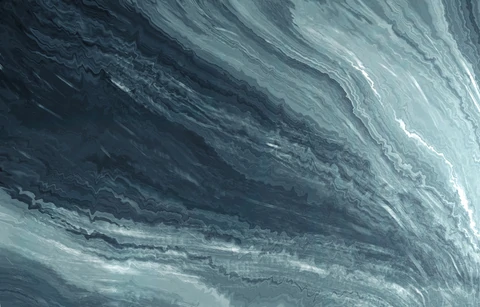- Daniele Pieroni
What We Could Learn from Our Oceans: Learning to Care and Improve the State of Our Waters

Digital Art by Daniele Pieroni
Much like the human body, the majority of our planet is made up of water. Although our oceans extend in every direction, bathing every shore, we rarely think of the Earth in that manner. Generally speaking, we rightfully concern ourselves with our land masses. Our lives are tethered to the ground after all, but is this a valid excuse to neglect and worsen a vital component of our planet’s overall health? Absolutely not.
Outside of housing a speculative one million species, the ocean is of dire importance for multiple reasons. Firstly, it provides us with close to half of the Earth’s oxygen. Phytoplankton, tiny plant-like organisms, contain chlorophyll that fuels them. Consuming carbon dioxide, these phytoplankton leave us with oxygen as a byproduct.
The oceans also serve as an immense mitigating force on the environment. It absorbs most of the heat emanating from the sun, which is later transported throughout the world, via currents. Currents are therefore responsible for heat distributions that regulate temperatures throughout the globe. If our bodies of water’ temperature goes up (which they have), we’ll notice.
And lastly we’re dependent on the ocean as one of our primary sources of food. Fish accounts for a sizable percentage of the globe’s daily meat consumption. Marine life is susceptible to our poor treatment of the ocean which makes us susceptible to ocean degradation through our food. Pollution worsens marine life’s ecosystems. Often mistaking broken down particles of trash for food, animals ingest potentially fatal substances. Is it safe to gamble with the state of marine life?
Although much of our current fishing consumption is recognized as safe, the ecosystems aren’t. Outside of the destructive effects of our fishing patterns, the balance of the ocean is dependent on species relying on their source of food; once that food security is gone the effects can be catastrophic.
So what can we do? Ideally, we start from our land masses. An important element in reducing the waste poisoning our oceans, is preventing it from getting there to begin with. Therefore the road to cleaning up our seas must start on land. By identifying the gravest contributors to marine pollution, we sever the steps that cause said poisoning. So what are the gravest contributors to pollution?
Plastic. A downside to being extremely malleable and multipurpose, is that it’s in everything. It can be anywhere from our water bottles to our clothes, but why is that? For one, it’s cheap. Plastic is mainly produced for how accessible it is. So by recognizing the destructive force of plastic, we can attach a global target to it.
This is where a company, like Parley, can step in. Parley has been fighting against ocean pollution internationally, striving to collaborate with every country with a shoreline in the near future. With a host of initiatives built on the collaboration of NGOs, they’ve successfully connected thousands passionate in saving our seas.
Their missions have ranged from decluttering the largest collections of plastic circulating the oceans, to collecting deadly abandoned net entanglements all under the acronym of AIR. AIR stands for Avoid Plastic wherever possible, Intercept plastic waste and Redesign the material waste.
Parley takes a diverse approach to confronting this imposing problem. They view themselves as a collective not only made up of activists but of creatives. By having an extensive collective of individuals they allow for multiple walks of life to contribute.
They’ve also decorated their merchandise with that same vision of accessibility. Reusable bags made out of recycled plastics in turn fund the eventual cleanup of further polluting agents; so as a consumer you can rest assured that your money has served in contributing to their efforts. It’s a miniature recreation of what our cycle of consumption could be.
By setting a precedent that it isn’t too late to properly care for the oceans, brands like Parley stand against models that prioritize profits in light of waste. They set forth standards not just for their company, but for what we accept for the Earth. Because it’s time we adopt a holistic lens that takes in consideration the destructive patterns we’re all caught in.
References:
Parley. (n.d.). A GHOST NET’S 700 MILE JOURNEY ENDS IN HAWAII. Retrieved May 28, 2021, from https://www.parley.tv/updates/2019/4/29/parley-intercepts-drifting-ghostnet-off-hawaii
Parley. (n.d.). Parley For the Oceans. Retrieved May 28, 2021, from https://www.parley.tv/#collaborations
Parley. (n.d.). Facing Plastic Pollution. Retrieved May 28, 2021, from https://www.parley.tv/oceanplastic#parley-air-strategy-1
Sean Fleming, S. F. (2019, August 29). Here are 5 reasons why the ocean is so important. World Economic Forum. https://www.weforum.org/agenda/2019/08/here-are-5-reasons-why-the-ocean-is-so-important/
